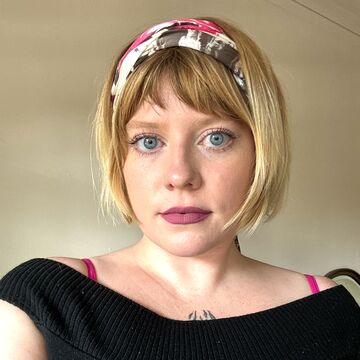

Emilka Wolniewicz
Continuing Studies Instructor
Contact
Bio
Emilka Wolniewicz holds an MFA from the School of the Art Institute of Chicago within the Fiber and Material Studies Department, and a B.S. in Nutrition and a B.A. in Human Physiology from the University of Minnesota.
Emilka Wolniewicz has several publications. Her Master of Fine Arts thesis “Revolt Fashion: Polish Resistance Fashion Art Movement” is published within the School of the Art Institute Repository, and her Bachelor of Science research paper “Polylactose and Bile Extraction in Rats” at the University of Minnesota Conservancy. Emilka published an essay “Landfill Anatomy” in Wovenutopia Mag 5 S/S, and poems “TRASH PROCESSING” in Wovenutopia Mag 6 W/S and “Babka Je Babkę” in Vernacular Magazine, Volume 2.
Emilka has participated in group shows with works "PURSES X SHOULDERS" at the International Museum of Surgical Science, Chicago, IL; “HOT PLASTIC BAG 1” at the 18th Annual Chicago Food Justice Summit in Chicago; “STRONG LEGS” at Air Gallery Glencoe, IL; performance “AND THE HOME OF THE [PLACEHOLDER] - S1E3” at Nonation, Chicago, IL. Emilka had her video and film work “HAPPY MEAL” and “perfumes” screened at the Gene Siskel Film Center.
Personal Statement
Emilka Wolniewicz, MFA (she/her) is a Polish-American artist, writer, and researcher. She is fascinated by theories of fashion and objects, chaos, consumerism, text, collected materials, translation, beauty and wit, and how these entities merge together. Guided by words, and working through hand and body, Emilka uses material from packaging, informative labels, and magazines, as well as surrealist automatism and photography. Her practice investigates politics of consumer culture, magazines, advertisements, and temporality. She plays with collaging in digital weavings, code, garment construction, stitching, and embroidery, with specific material considerations such as cotton, found objects, light, and heavy conceptual thought.
Taking the theory of objects, Emilka constructs pieces that correspond to utility, but retain artful auras, allowing them to hold passions of the subject. In response to the particular chaos of commodities and pop culture at large, her work disrupts the innate utility of textiles, while still preserving their history. It is ornamented with extravagant bizarreness, story, and wit through overwhelming scale, texture, and hue. It is these conceptual considerations, as well as study of text and objects that are substrates to her artistic work fostering reflection on the peculiar actions of contemporary popular culture.